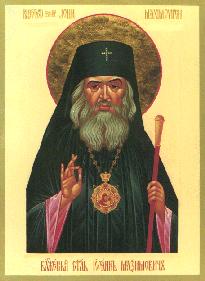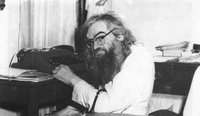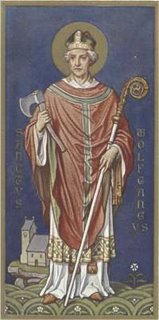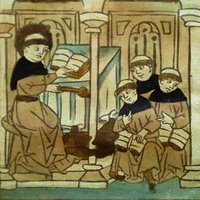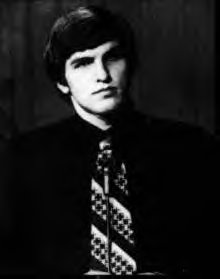I tried putting this up as a link, but it didn't work. I thought it was a very moving and important story about the founding of a new Orthodox monastery in Poland. It comes from Father Andrew Phillips' site, Orthodox England (see link on the right), "http://www.orthodoxengland.org.uk." I HIGHLY recommend this site. It is absolutely packed with information about Orthodoxy, Church history, Lives of saints, and prayers.
ORTHODOX POLAND: A Polish Orthodox Monastery Established
"Twenty years ago the Polish Catholic monks, Fr. Nikodim and his brother monk Fr. Atanazy, were living in Krakow. They had been monks at the Czestochowa monastery in Poland, but in studying liturgics, they realized that the Roman Church had slipped away from ancient liturgical practice, which, they concluded, had been preserved in the Eastern Rite. For a year and a half, whatever the weather, they made the trip by tram to the grave of Saint Faustinia, located at the convent where she had lived. They prayed that she might help them to found an Eastern-rite monastery.
In 1985 Fr. Atanazy had a dream. 'I was asleep', he recalled, 'in my room in Krakow. The saint appeared and, although I recognized her, I asked, 'Who are you?' 'I'm a saint', she replied. 'If you are a saint,' I said, 'then help us to find a place to build a monastery'. She said that a monastery would indeed come into being. 'It is not dependent on my prayers or yours. 'The monastery is needed and it will be built, because', she added, 'it is the will of God.'
This gave the monks great encouragement, and they set out to find a suitable piece of land. Responding to ads in newspapers, they looked over several properties (some of the owners, on learning they were monks, increased the prices), but none of them struck the monks as being suitable. Then on 5 July, the feastday of St Athanasius of Mt Athos, they came to Ujkowice, three miles from Przermysl and not far from the Ukrainian border. They climbed a hill and could see forests, fields, villages - and an old Eastern-rite church in ruin. The monks nodded their heads: 'Tbis is the place!' A month after Fr. Atanazy's dream, they secured the property, eight and a half acres.
There was an old barn and cowshed on the property. Adjacent to the barn, the monks built a small, stone chapel and placed an icon of the Mother of God over the doorway.
One day in late autumn, two women passing by on the road stopped before the chapel and, making the sign of the cross, began to pray. They prayed and wept. When the monks made their acquaintance, one of the women explained:
"My father, Mikolaj Kania, died a long time ago, but as long as he lived here, he used to say, 'Here in this place, the Mother of God will appear. There will be a monastery here.' Here was another sign.
In establishing their monastery, the monks encountered all kinds of obstacles. Just a week after they purchased the land, the Roman Catholic Curia sent a letter to the court in Przemysl, claiming that it had been purchased illegally, since Uniats in Poland could not buy land in Poland without the permission of the Roman Catholic Church. Fortunately, the monks had bought the land not as clerics but as private individuals, for agricultural use. So the Roman Catholic claims were rejected.
Some people began to come to the monastery. Women and children would come regularly for evening devotions to the Mother of God. There was even talk about possibly renovating the derelict Eastern-rite church, which had been closed in 1946. In May 1988, however, the Roman Catholic priest forbade the children from going to the monastery. Rumours began circulating against the monks.
On 18 August, 1988, the eve of the Feast of Transfiguration, some boys from the village came to the monastery: 'Oh, fathers, tomorrow at noon there will be a lot of flags and protest signs, and people will come and destroy the monastery walls'. It.was already nearing eleven o'clock. The monks took seriously the threat and, in spite of the late hour, they drove to the police station for help. When they arrived, relates Fr. Nikodim, 'we saw a woman talking on the phone, explaining to someone that all the phones in front of the post office were out of order. As she was leaving she saw us, stopped, and greeted us in Ukranian: 'Glory to Jesus Christ'. We responded, 'Glory forever'. She then added, 'Who is with God, him will God help'. And she left.
After a police officer had taken down our report, we drove back, thinking about the woman. What was the meaning of her words? Was this God's way of telling us not to trust 'in princes and the sons of men', in physical force, but to trust in Him?'
The monks decided to increase their prayer and fasting. 'Because prayer', they said, 'is a force more powerful than any other - the mightiest. It is a spiritual rocket that always aims at the right target'.
The protest against the monks took place the next day. Black ribbons were placed on red and white Polish flags. And there were slogans: 'Do not destroy the legacy of generations', 'We don't want the people of our village to be at odds', and, 'Down with the monks!'
Not long after the monks had purchased their land, they were confronted with a slanderous declaration signed by a committee of thirteen. At this point, says Fr. Nikodim, 'we knew who it was we were fighting with. It was not these people, but someone else. We knew how to fight him - by prayer and fasting. We wrote these thirteen names on a sheet of paper and placed it on the altar, under the relics of the saints that we had gathered here: Saint Basil the Great, Saint John Chrysostom, the Great-Martyr Barbara, Saint Stanislav, Saint Paul the Hermit, Saint Anthony of Egypt, and a particle of the True Cross'.
Several days later, a policeman from Przemysl arrived at the monastery. 'I have heard that there is a sheet of paper fixed to the altar here, and that on it are names of those who will be punished by God', he said to Fr. Nikodim.
Fr. Nikodim was astonished. 'Only the two of us knew about the sheet of paper on the altar. We realized that if Satan told people things that could not have been known by anyone else, it meant that this place must be exceptional'.
The brothers continued to meet with obstacles. They had to go to trial for building the wall around the monastery. Fortunately, the court decided in their favour, stating that the wall had been built according to an approved design, so that no one could tear it down.
Before the wall was built, some people who harboured ill-will toward the monks would come at night and steal supplies. On one occasion, just before an impending storm, someone ripped open bags of cement the monks were using in building their wall. By God's mercy, the clouds scattered, and there was no rain to ruin the cement.
But along with the obstacles, the monks also received encouragement.
'We were in Kalnikow for the celebration of the one thousandth anniversary of the Baptism of Rus', recalls Fr Nikodim. 'Bishop Adam of the Polish Orthodox Church was there. We were in need of encouragement, and he gave it to us'.
'You have already won', the bishop told them, 'just by persevering and staying on in that place. But remember, don't accuse the people; they are the least guilty. Someone entirely different is behind it'.
These were beautiful words', recalls Fr. Nikodim. 'To this day I bear no resentment towards the people who caused us so much harm. I can shake hands with each of them, because I know that my enemy is not material man, but immaterial spirit - the Evil One. He knows perfectly well what the role of this monastery is to be, and he wants to prevent it'. Indeed, he explains, 'a monastery is like a spring from which the grace of God and love flows, purifying people and changing them. That, in fact, has been our experience. The people here are different from what they were in 1986 when we first came'.
As the years passed, it became evident to the monks that the Eastern Rite was not the end of the journey to the One, Holy, Catholic and Apostolic Church. In December 1993 Fr. Nikodim wrote to the Metropolitan of the Orthodox Church in Poland, asking that the monastery be received into the Orthodox Church. So many thoughts filled his mind that the letter soon reached the proportions of a novel. This was not suitable, so Fr. Nikodim began again, very simply: 'Your Eminence, forgive us but we know the Polish Orthodox Church as if through a keyhole. We have not been in touch with any of the monasteries or monks, except for Fr. Basil from Kalnikow and a few others…'. And with this application the brothers went to Warsaw.
It was the feast of Saint Nicholas. They met the Metropolitan after the Liturgy.
'He came as the sun out of the clouds', the brothers related afterwards. 'Smiling, he embraced and kissed us. As we were talking, before we handed him our application, he said to us, 'My children, I know your monastery as if through a keyhole ...'
The monks looked at each other and nodded their heads. They knew they had made the right decision.
The Monastery of SS Cyril and Methodius was officially received into the Polish Orthodox Church on 7 June 1994, the very day the decision was made to glorify Saint Maxim Sandowicz who had struggled, as these monks were doing, to bring Orthodoxy back to his native land.
'Orthodox Christianity is indigenous to Poland', observed Fr. Nikodim. 'SS Cyril and Methodius arrived here before the Western Schism of 1054. There was only one Christendom, and it has survived down to our own day in the form of the Orthodox Church. Clearly, Orthodoxy is not alien to Poland, it was not brought by any tsar, it is our own. It has shaped the Polish state since its inception, for about twelve hundred years. Orthodoxy in this land is native, like the Vistula and San rivers, which flow through the country, watering the soil, and making it fertile. You can't ignore this river, and you can't dam it up because sooner or later the dam will break, such is the nature of the river'.
From behind the high wall can be seen the church. Fr. Nikodim opens the massive steel gates. On the right is a cemetery with several graves. Ahead is the chapel, and next to it an old barn. Further on is a refectory and a stable reconstructed to house monks' cells. Still further is another building, whose downstairs is reserved for cows, goats, and chickens; upstairs are Fr. Atanazy's quarters. In the summer, Fr. Atanazy lets the volunteer helpers use his room, while he rnakes his bed in the hay. The summer nights are short. Evening services are conducted after supper until midnight, Divine Liturgy begins about 5.30 am.
At the monastery, even the longest day can be too short. There is always much work to be done. Fr. Nikodim and Fr. Atanazy built the 650-metre long wall themselves, moving hundreds of cubic metres of concrete in a wheelbarrow. Now there are more monks, but the farm is also bigger. Mikolaj Kania's daughter, Maria, donated three acres of land when she learned that her father's prediction had come true. An additional thirtv acres were purchased and are now under cultivation. An orchard boasts thirty-two varieties of apples and pears, pollenated with the help of eighteen bee-hives. The monastery has electricity, but the monks have to go a quarter of a mile for water. The monastery need a large holding tank for water. And a road must be built. The old road to the village is negotiable only in summer.
Of course, there are those that are against it. When monks began work on a road, some people cursed them, seeing in the monks a threat to the existing Roman Catholic order (all six monks are former Roman Catholics, and the monastery it already attracting many Roman Catholic from Przemysl, Krakow, Ukraine, and twenty-eight children have been baptized). But the monks are imposing their faith on no-one. They are simply providing an opportunity for those who wish to return to the Faith of their ancestors. At one time the Przemysl diocese numbered some three million Orthodox faithful. Then came the tragic 'Brest Unia' of 1596, cleverly engineered to align the people with the interests of the Roman Catholic Austro-Hungarian Empire. Those who refused to accept the Unia were made to suffer economically and were otherwise persecuted. The last Orthodox monastery to hold out against the Union was the Maniawski Skete, which was destroyed in July 1786 by Austrian artillery. Precisely two hundred years later, in July 1986, Orthodox monasticism in the Przemysl diocese was reborn.
In spite of these difficulties, not to mention financial limitations, the monastery is thriving. In 1995, the diocesan celebration of the 1100th anniversary of the repose of Saint Methodius was held at the monastery, at which time Fr. Nikodim was elevated to the dignity of Archimandrite. The following year, Metropolitan Basil of Warsaw and All Poland, in the company of other bishops and clergy from Poland and Ukraine, blessed seven bells for the monastery, the largest weighing three-quarters of a ton.
The monastery is virtually self-sufficient. The monks bake their own bread; they grow their own food; they have done all the building themselves chapel, kitchen, refectory, monks' cells, two farm buildings. One of the monks is a skilled blacksmith. The superior, Fr. Nikodim, is a trained builder, with a specialty in woodworking. Another brother is a former Olympic gold medalist weight lifter! He now wheels barrows full of concrete.
In the spring of 1998, the monastery was given a copy of the wonderworking Vatopedi icon of the Mother of God. This icon had been in Russia for two hundred years before customs officials discovered it aboard a train bound for Germany (it was probably stolen as part of the lucrative icon smuggling business). It was sold at auction and was purchased by a wealthy, pious woman. One night the woman had a dream in which the Mother of God told her: 'Give me away'. The woman went to ask the advice of Metropolitan Basil in Warsaw. Without any hesitation, the Metropolitan replied, 'Give the icon to the monastery of Ujkowice'.
The icon is currently housed in the monastery chapel - where a lamp always burns before it. Several people have experienced miraculous healings after being anointed with the oil and after having an intercessory service celebrated before the icon. (At Metropolitan Basil's behest these cases are now being recorded.)
More and more people have been coming to pray before the icon, and, with the growth of the monastery, the need for a larger church has became imperative. Orthodox brothers and sisters! The monks of Saints Cyril and Methodius Monastery appeal to your generosity. Please help them firmly establish themselves, in spite of their adverse circumstances, as a beacon to the countless souls who thirst for the true faith in this age of almost universal apostasy and materialism, faithful to the legacy of those; saints who brought Orthodoxy to that comer of the wor1d and those who later defended it, even to the shedding of their blood: Saints Cyril and Methodius, Saints Vladimir and Olga, Saint Job of Pochaev, Child Martyr Gabriel of Bialystok, the martyrs of Vilnius, and, in our own century, Priest Maxim Sandowicz of the Carpathians."
Correspondence may be addressed to:
Prawoslawny Monaster Sw. Cyryla i Metodego
Ujkowice 110
37-713 Mackowice
Woj. Przemysl
POLAND

